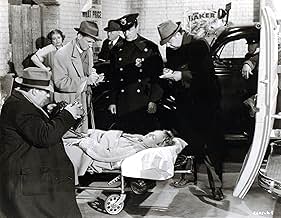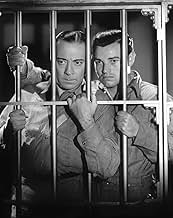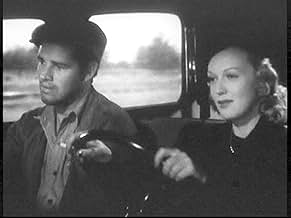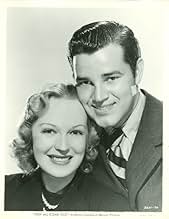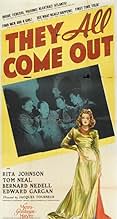Ajouter une intrigue dans votre langueA "Crime Doesn't Pay" morality drama about a young man sentenced to a prison term and attempts by the system to rehabilitate jailed criminals.A "Crime Doesn't Pay" morality drama about a young man sentenced to a prison term and attempts by the system to rehabilitate jailed criminals.A "Crime Doesn't Pay" morality drama about a young man sentenced to a prison term and attempts by the system to rehabilitate jailed criminals.
- Réalisation
- Scénario
- Casting principal
- Associate Warden
- (non crédité)
- Assistant Cashier
- (non crédité)
- Guard
- (non crédité)
- Convict
- (non crédité)
- Hughie
- (non crédité)
- Federal Marshal
- (non crédité)
Avis à la une
PS...Dumb title. Sounds like a slogan for spot remover.
The problem with the film is its one-sided view of things. In the real world, every guard, warden and board member is not so altruistic or benign. And politics can interfere with good intentions. Still, it paints a picture of a model prison system that is worth keeping in mind.
The film also minimizes the extent to which anti-social inmates and their social structures make meaningful reform (of individuals) extremely difficult. In today's world, this film might be considered naïve.
But the concept of justice is at the heart of the film and it rings just as true today.
When the story begins, Joe (Tom Neal) is out of work and hungry. When he meets Kitty (Rita Johnson) he thinks his luck is improving, as she buys him some food and takes him with her on a cross-country drive. However, she works for Reno Madigan, a career criminal who runs a gang who robs banks. Soon, Joe is their driver and soon after that, the gang is captured.
The next portion of the story shows a very detailed account about how federal prisons operated back in the day. Much time in the film is spent showing how the prisoners are sorted according to their likelihood of being rehabilitated. Joe is a first-time offender, and they offer his job training and more. Reno, naturally, is NOT an ideal candidate and his behaviors soon result in his being sent to Alcatraz. But there's much more to it than this...as well as an exciting and satisfying finale.
Despite the film seeming a bit overly idealistic at times, it never is dull and first time director Jacques Tourneur did a great job with this B-movie. It also helped that despite being a B, the budget was bigger than usual and allowed for filming at various penitentiaries across the nation. Worth your time.
Here it's half-and-half starting with the usual Depression-era gangsters robbing banks where Rita Johnson's Kitty makes a terrific femme fatale... but with a soft side... working for no-nonsense gang boss Bernard Nedell as Reno, who leads muggy thugs and a young handsome driver that the dame actually discovered: Enter future DETOUR actor Tom Neal displaying genuine toughness... yet there's some good in him too...
And just as the rudimentary rugged crime flick picks up violent steam, the girl and men are captured and thrown into various prisons. But Tourneur keeps the stories interesting, even when the propaganda kicks into high gear...
As affable officials decide upon what's best for their inmates sans cinema-cliché sadistic wardens, bullying guards and shiv-shoving inmates, THEY ALL COME OUT maintains a pulpy page-turning cadence, keeping the viewer intrigued about how things'll turn out despite being fairly obvious.
Le saviez-vous
- AnecdotesThe original trailer for They All Come Out (1939) claimed that it was the first to show the real truth about Alcatraz and other federal prisons. In fact, this started out as a four-reel documentary short on federal prisons. Louis B. Mayer asked shorts director Jacques Tourneur to expand the documentary. Mayer liked what he saw and ordered Tourneur to use the footage to create a feature film of fiction. This became Tourneur's first American feature film.
- GaffesToutes les informations contiennent des spoilers
- Citations
[first lines]
Self - Former Attorney-General: You know, Jim, I've been thinking. You have one of the most interesting jobs in the whole Department of Justice. Here you are, in charge of twenty-eight federal prisons, and eighteen thousand prisoners. The people apparently have very little realization of that phase of our work. They don't seem to realize that every time a prison door opens, and a man goes in, another man comes out. That in a way is a challenge of the federal prison system. Some day, some how, all these prisoners come out, come back to live among us. Now, we've done a very great deal for these men, and it seems to me that the public ought to be told about it.
Self - Director of the Federal Bureau of Prisons: They should be told, but it's a big story, and it's a hard story to tell because every single case is different. Let's take a look at a typical case of interstate bandits...
[switches to the story of Reno Madigan's gang]
Meilleurs choix
Détails
- Date de sortie
- Pays d’origine
- Langue
- Aussi connu sous le nom de
- Almas que regresan
- Lieux de tournage
- Chillicothe, Ohio, États-Unis(U.S. Industrial Reformatory)
- Société de production
- Voir plus de crédits d'entreprise sur IMDbPro
- Durée1 heure 10 minutes
- Couleur
- Rapport de forme
- 1.37 : 1

